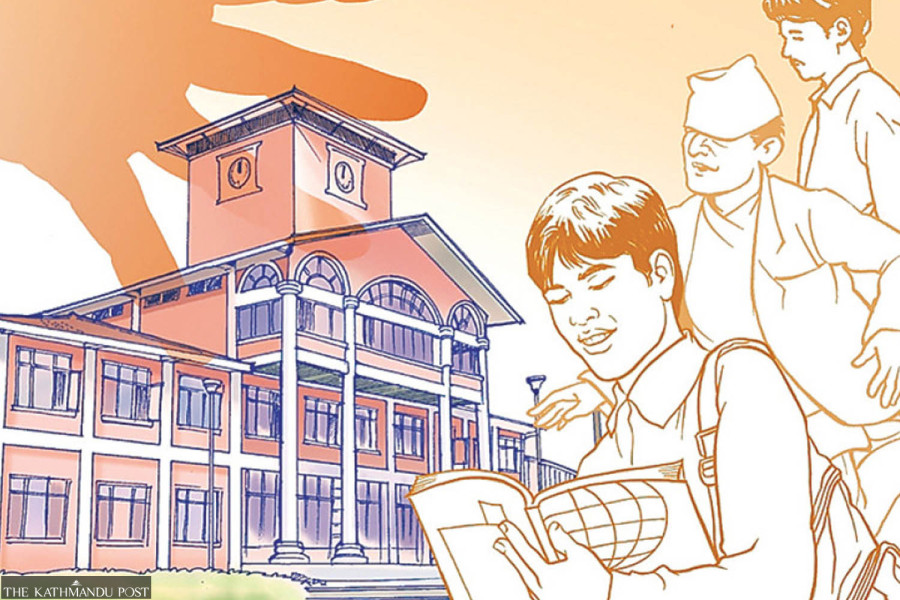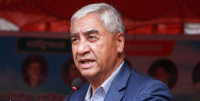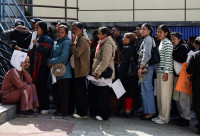National
Political interference plagues Nepali varsities. VC resignation is latest case
Education experts say political meddling in higher education won’t end until prime minister and education minister stop acting as chancellor and pro-chancellor.
Binod Ghimire
The resignation of Keshar Jung Baral as Tribhuvan University vice-chancellor has again exposed the executive’s interference in the academic sector.
He submitted his resignation on March 28, citing poor health as the reason. However, he spoke out after Prime Minister KP Sharma Oli approved his resignation on Thursday. “It was better to quit than to succumb to interference from the chancellor,” Baral told the Post. Oli is the ex-officio chancellor of the university.
Baral said Oli’s blatant interference was visible right from the university’s senate meeting in December. Although Baral wanted his four-year plan under the TU’s 2020–2030 strategy to get endorsed from the senate, Oli, who was chairing the meeting as chancellor, did not support it. Baral had expressed his reservations at the meeting itself.
“It took months to get him to certify the minutes of the senate meeting. He also tried to interfere in the appointment of deans,” Baral said. Settlement of the issue of contract and part-time lecturers, who want permanent status through internal competition, was the trigger for his resignation.
“This issue cannot be resolved by the university without the government's support. However, several attempts to meet the prime minister failed due to the reluctance of his secretariat. It was an embarrassment,” said Baral.
Baral said the tendency to interfere is not limited to Oli. Most prime ministers who he worked with in the past had also interfered, although the level of interference varied.
When he was VC at Pokhara University for four years from 2007, he faced similar interferences from the chancellors.
Educationists say the problem is not going to end so long as the prime minister and the education minister continue to serve as chancellor and pro-chancellor.
“Universities, in principle, are autonomous entities. However, the authority given to the prime minister to appoint the VC creates room for interference,” Binay Kusiyait, a TU professor, told the Post. “Mostly, those close to ruling parties are appointed to the position. When people like Baral get appointed based on merit, they are compelled to resign.”
Therefore, for years, educationists have spoken against the provision of having the prime minister as chancellor. They argue that a board of trustees composed of the nation’s eminent personalities should have the authority to manage the universities, not the prime minister and education ministers. The newly formed University of Nepal has adopted this model. Bindu Nath Lohani has been appointed its first VC by the board of trustees.
As the authority for the appointments rests with the prime minister, vice-chancellors, who are the executive head of universities, are being appointed based on political power-sharing. This, according to educationists, is the root cause of the drop in the quality of university education.
“Having served as VC twice, I can say the executive heads of other universities face similar interference. Maybe they are compromising, which I could not,” said Baral.
Education experts say despite visible interference from the executive, unlike Baral no other VC had dared to speak out publicly. They see this as an opportunity to start a discussion and put pressure on those in power to revise the legal provisions for the prime minister and the education minister to be the chancellor and pro-chancellor, respectively. “This is the right time to accelerate discussions to find ways to end politicisation of the academic sector,” said Kusiyait.
There is a long history of interference in universities. However, the culture of political sharing of major university positions that started after 2006 has deepened partisan influence. It took the erstwhile Pushpa Kamal Dahal government more than three months to appoint Baral to the position.
Though Dr Dharma Kanta Banskota retired in the first week of November 2023, Dahal was reluctant to pick his successor. Shiva Lal Bhusal, who is close to his party, led the TU as acting vice-chancellor, until February last year.




 22.17°C Kathmandu
22.17°C Kathmandu














